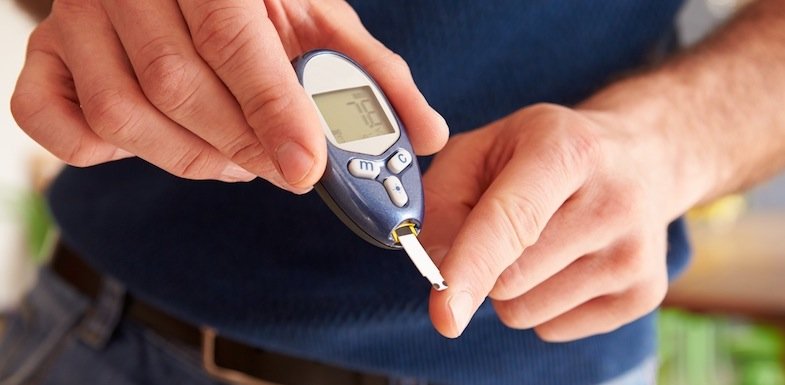Sugar is one of the most common food additives that adds no nutrient, but lots of calories. On top of that, eating too much sugar can also lead to and increase weight gain and many conditions like diabetes and heart disease. The American Heart Association suggests that adult women should only consume 25g and men 37.5g of sugar at most per day. That is a scary number if you consider that the average U.S. adult averages close to 90g of sugar a day! For those who are considering sugar and chronic pain, that number may be even lower because sugar can lead to more inflammation in the body. Let’s find out how sugar operates in the body and why it is so important to give up sugar as much as possible.
Sugar and chronic pain: How does it work?
It’s time for science! When natural sugar (glucose) is eaten, it permeates the walls of your intestines, which tells the pancreas to secrete insulin. Insulin in turn takes the sugar from your blood and moves it into your cells to be used as an energy source. Your body produces leptin to signal to the brain that it is full and you stop eating. Simple, right?
Well, what happens when you consume large quantities of added sugar (sucrose and fructose) in the amounts that is contained in most canned sodas?
First, your liver tries to convert this compound into usable energy, which has the side effect of producing bad cholesterol and putting your liver into overdrive. Then, your body is flooded with insulin in response to the high amount of sugar in the blood stream. A classic sugar rush ensues and your brain tries to regulate it by dumping serotonin into your blood stream that leads to that nasty sugar crash. You’ve been there—we’ve all been there. However, that high production of insulin also blocks production of leptin, the hormone that informs your brain that you have eaten enough. Because of this, you keep eating without even realizing all the calories you just consumed.
What are the effects of sugar?
Sugar, the wonderfully sweet granulated bliss that makes your tongue happy isn’t so good for your body. Refined sugars have been blamed for everything from inflammation to belly bloat and weight gain.
A sweet tooth is something most people have to contend with every day, but there are a few benefits that sugar provides the body:
- Provides instant energy: Sometimes you just need an extra boost to get you through that Monday morning meeting
- Raises blood pressure: While not great for most of us, downing some sugar can stop you from negative effects if you’re suffering from low blood pressure
- Provides a short-term cure for depressed mood: Sugar gives you a sugar “high.” This is most certainly not a solution for depression, but it could help with a depressed mood or bad day
Negative side effects
With the good comes the bad. In the case of sugar, there are a lot more negative side effects to its consumption:
- Increases inflammation: All of that sugar has the painful side effect of increasing inflammation. This can lead to some serious issues as your liver gets overworked and it can really do a number on your joint and heart health. For pain patients, in particular, this is a huge effect that sugar can have that should be closely protected against. Sugar and chronic pain do not go well together.
- Decreases immune response: Animal studies have shown that a lot of sugar can suppress the immune system as yeast and bacteria feed off of it.
- Accelerates aging: Sugar can attach to proteins and slowly deteriorate the elasticity found in body tissue. This can lead to faster aging in the arteries and organs.
- Causes tooth decay and gum disease: As we all know, sugar can have a nasty effect on your mouth. Take a look at a classic experiment where a tooth left is left in a glass of coke.
- Increases stress: Sugar highs can mimic the stress response by raising blood sugar levels, which in turn promotes the body to pump out adrenaline and epinephrine for what the body thinks is much needed energy. While usually these hormones are beneficial, they can also make you feel more irritable and anxious.
What does research say about sugar and chronic pain?
Naturally occurring sugars, the sweet stuff found in fruits and vegetables, pose minimal harm. An increasing body of research has pinned an ugly head on refined sugar, included in baked goods, candy, and ice cream. Health experts recommend reducing your intake or eliminating it all together.
Sugar is addictive
Of course, we’re not entirely at fault for craving sugar like a drug; some research has found the sweet stuff leads to addiction.
Sugar releases dopamine and natural opioids in the brain, the same chemicals found in highly addictive painkillers. A 2008 study published in Neuroscience and Biobehavioral Reviews found that under certain circumstances, rats can gain a dependence on sugar, although the scientific jury is still hung on the matter.
Humans’ sugar dependence has a biological purpose. In our hunting and gathering days, people knew that if a food they tasted was sweet, it was ripe and not poisonous. However, sugar has changed over the years. Today, people eat not only refined, granulated sugar, but also high-fructose corn syrup, a processed sugar that’s found in nearly all processed foods.
Sugary drinks, including soda, fruit juice–which, if you check most labels, doesn’t actually have much juice–and sports drinks, are a major contributor to obesity, diabetes, and heart disease. All of these can increase your risks of chronic pain and flare-ups.
Sugar and weight gain
An increasing body of research says sugar causes as much weight gain, if not more, as dietary fats.
In 2011, New England Journal of Medicine published a 20-year review of nearly 121,000 men and women that analyzed their weight gain. Sugar-sweetened beverages ranked third among the five top causes of weight gain, behind potatoes and potato chips. Another study, published in the American Journal of Clinical Nutrition, found that people who replaced sugary drinks with non-caloric beverages saw an average weight loss of anywhere from 2% to 2.5%.
Sugar has no nutritional value, and eating it makes your blood sugar spike. This can put you at increased risk of diabetes, as your body produces more insulin to process the sweet stuff. Elevated blood sugar can also lead to inflammation. This exacerbates chronic pain and can lead to a host of other health conditions.
Should I give up sugar altogether then?
With so many adverse effects to consider, maybe it is time to start giving up sugar. So, should you give it up? The short answer is no.
It’s not a good idea to go cold turkey on your sugar habit, especially from a mental health perspective. It can also lead to some bad withdrawal symptoms including headaches, hunger cravings, and depression.
The classic food pyramid put sugar and sweets at the very top. However, with the new MyPlate Guidelines, added sugar and sweets are not suggested as any part of a balanced diet. Some sugar is a natural part of the diet and can be a great source of energy (especially when enjoyed from whole food sources, such as fruit), but it most certainly isn’t meant for large-scale consumption. It can also be difficult to cut sugar out completely as almost all prepackaged food comes with added sugar.
Knowing this, giving up sugar completely is not possible or healthy. In life, remember that most things are not bad, in moderation. However, there are some ways to remove most added sugars from your diet.
How can I reduce my sugar intake?
If you want to give up sugar, or the majority of it, from your diet, let’s get SMART. SMART goals can guide you when making a behavior change.
Here are some valuable, SMART tips on how to give up sugar:
- Cleaning out your kitchen is usually a great first step. Removing temptation, especially when you are hungry, can be critical to kicking your sugar habit.
- Always check out the food labels. Sugar sneaks into almost everything nowadays, so keep an eye out and opt for brands and products with less added sugar!
- Try planning your meals out beforehand—when you’re not stressed, tired, or hungry. It can be surprising how fast that sugar content can add up if you aren’t paying attention.
- Avoid sugary drinks. Sodas are a huge culprit of sugar overdose and can easily fill your daily healthy limit of sugar in a single can.
- Exercise daily. Adding 20 minutes of physical activity into your day can increase your energy levels and reduce the need for a sugar boost.
- Avoid sugar alternatives and substitutes! While you won’t get the calories, you will still have the psychological desire for sugar. It is best to taper off and kick the craving all together. Once you start reducing the amount of sugar you eat, you’ll find that your body needs less to fulfill that sweet tooth!
What are your thoughts on sugar and chronic pain? Do you notice flare-ups when you eat more sugar?


I have a link between sugar and pain , specifically lower spinàl pain . I know if I am about to have an episode because I start craving sweet foods or breads . Or is it the other way around . For some reason the cravings hit and that causes inflamation and then the pain ? . I know I am a lot better now I have dramatically reduced sugar and processed food intake .
Thanks for sharing your story David!
I have had chronic low back pain for many years. I notice that in the evenings when I eat something sugary I immediately start to get an antsy feeling in my low back that in turn increases my pain. In my opinion the sugar/pain/antsy feelings are all related.